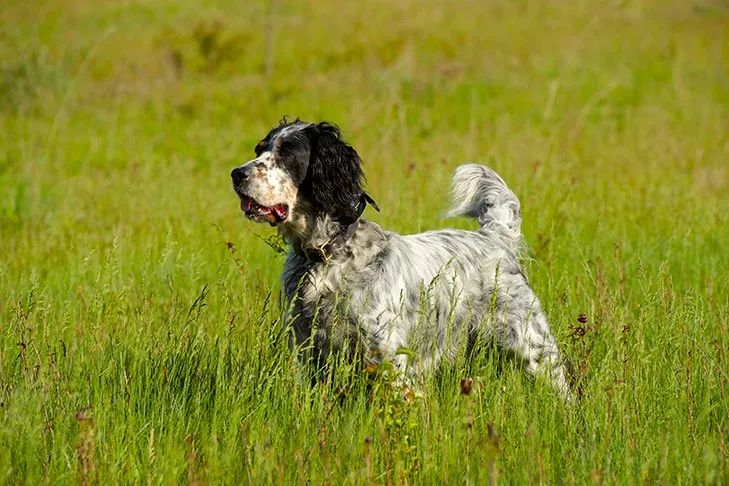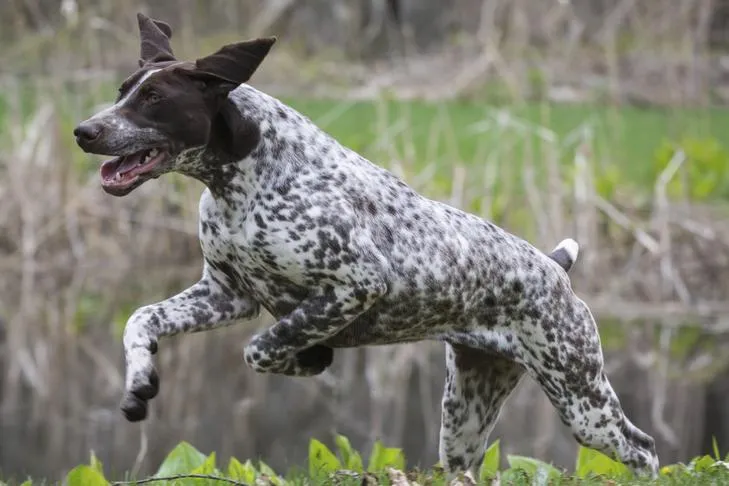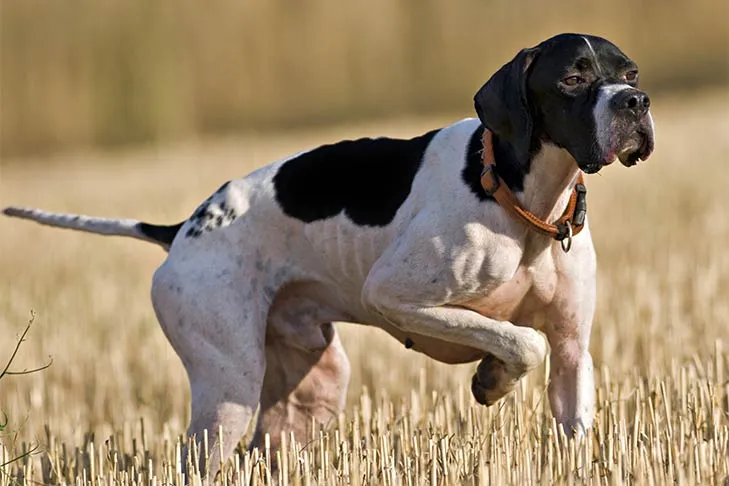For centuries, hunting dogs have been indispensable partners to humans, revered for their keen senses, unwavering loyalty, and impressive athleticism. Among these dedicated companions, Black And White Hunting Dog Breeds stand out with their striking appearance, often showcasing distinct markings that make them easily recognizable in the field and cherished at home. These breeds combine functional brilliance with an elegant aesthetic, making them a popular choice for hunters and active families alike. Their distinct coat patterns, ranging from solid black with white markings to intricate ticking and belton patterns, not only contribute to their beauty but sometimes also offer camouflage or visibility depending on the terrain.
These intelligent and enthusiastic canines are bred to excel in various hunting disciplines, from pointing game birds to flushing quarry from dense cover and retrieving fallen prey. Their versatility, combined with their inherent drive and eagerness to please, makes them exceptional working dogs. Beyond their prowess in the field, many of these black and white hunting dog breeds also make affectionate and loyal family pets, thriving on companionship and requiring ample exercise and mental stimulation to be truly content. Understanding their unique traits, history, and needs is key to finding the perfect black and white hunting dog to join your family and adventures. Finding the right hunting dog can be a rewarding experience, and many seek out specific traits, even looking for black and white Basset Hound puppies for sale to fulfill their needs for a dedicated companion.
English Setter
The English Setter is one of the oldest British setter breeds, tracing its origins back 400 to 500 years in England, Ireland, and Scotland. Developed to hunt across varied terrains, this breed originally “set” or laid down when it located game birds. Over time, their hunting style evolved to standing and pointing, a hallmark of their expertise today. The English Setter is renowned for its elegant, uniquely speckled coat pattern known as “belton,” which frequently features distinct black and white markings, making them one of the quintessential black and white hunting dog breeds. Their coat offers excellent camouflage while tracking through diverse landscapes.
With a sweet temperament and graceful demeanor, the English Setter is often described as a “gentleman of the dog world.” They are medium-sized sporting dogs, known for being fun-loving playmates at home and friendly with other dogs and people. Despite their gentle nature, they possess a strong hunting drive and require regular exercise and mental engagement to keep them happy and healthy. Their distinctive black and white “belton” coat, combined with their excellent scenting ability and elegant point, makes them a beloved choice for bird hunters and families seeking an active, affectionate companion.
 English Setter with black and white speckled coat standing in a grassy hunting field
English Setter with black and white speckled coat standing in a grassy hunting field
German Shorthaired Pointer
Developed in Germany during the late 1800s, the German Shorthaired Pointer (GSP) was meticulously bred by crossing hounds with pointing dogs. The goal was to create a versatile, all-purpose bird dog that could also be a devoted family companion. This ambitious objective was brilliantly achieved with the GSP, a natural hunter and retriever that excels in the field, capable of hunting everything from raccoons to deer. While commonly seen in liver and white, or solid liver, many GSPs feature striking black and white ticking or large black patches on a white background, making them a prominent member of black and white hunting dog breeds. Their distinctive coat patterns are not only beautiful but also practical for blending into various environments.
The GSP is an intelligent, eager-to-please, and fast-learning dog, making them excellent family watchdogs and companions. However, their primary instinct is that of a hunting dog, meaning they possess high energy levels and a deep need to be kept busy with meaningful activities. They thrive on vigorous exercise, training, and opportunities to use their natural hunting talents. Their robust build, keen intelligence, and striking black and white coat variations underscore their reputation as exceptional hunting dogs and active, loyal family members.
 Black and white German Shorthaired Pointer running energetically through an outdoor landscape
Black and white German Shorthaired Pointer running energetically through an outdoor landscape
Pointer
The Pointer, often hailed as the “Cadillac of Bird Dogs,” has a history that may trace back to ancient Egypt, evolving through early modern Europe to become the devoted and durable gundog we know today. Its name perfectly encapsulates its primary role: to find and “point” to game birds. While Pointers come in various colors, including liver, lemon, and orange, many are predominantly white with prominent black markings or ticking, solidifying their place among the most iconic black and white hunting dog breeds. These bold markings make them visible in open fields while maintaining their classic hunting dog aesthetic.
Pointers possess an intense and natural affinity for finding, pointing, and retrieving game birds, driven by an eagerness to please their owners. Beyond their unparalleled hunting skills, Pointers are affectionate family dogs that generally get along well with other canines when not in the field. They are highly active and thrive when given opportunities to compete in hunt tests, field trials, and scent work, showcasing their intelligence and athleticism. Their sleek physique, powerful stride, and distinctive black and white coat variations make the Pointer an outstanding choice for serious hunters and active families who can meet their considerable exercise requirements.
 Black and white Pointer dog intently focused on game, standing on point in a field
Black and white Pointer dog intently focused on game, standing on point in a field
English Springer Spaniel
The English Springer Spaniel is a beloved and highly versatile gundog, renowned for its boundless energy, intelligence, and charming disposition. Originating in England, they were bred specifically to “spring” or flush game birds into the air for hunters. These medium-sized dogs are instantly recognizable by their athletic build and their flowing, often black and white, coat. The black and white coat is one of the most common and classic color patterns for this breed, featuring distinct patches of black on a white background, sometimes with ticking. This striking appearance makes them a popular choice among black and white hunting dog breeds.
English Springer Spaniels are enthusiastic in the field, demonstrating incredible stamina and a keen nose. They are excellent at retrieving on both land and water, thanks to their agile bodies and inherent desire to work. At home, they are affectionate, loyal, and playful companions, eager to be part of family activities. Their intelligence means they excel in various dog sports and are quick to learn commands. However, their high energy levels demand significant daily exercise and mental stimulation to prevent boredom and ensure they remain well-behaved and happy members of the family.
Cocker Spaniel (Working Type)
While often cherished as delightful family pets, the working type of Cocker Spaniel retains the strong hunting instincts for which the breed was originally developed. These smaller, sturdy dogs were bred to flush and retrieve game, particularly woodcock, from dense cover in the English countryside. The working Cocker Spaniel is typically more compact and possesses a higher drive than its show-bred counterparts. While they come in a variety of solid and parti-colors, black and white is a classic and popular combination, often seen in striking patches or roan patterns, solidifying their status as capable black and white hunting dog breeds.
Working Cocker Spaniels are characterized by their boundless energy, intelligence, and eagerness to please. They are highly trainable and excel in obedience, agility, and, of course, field work. Their smaller size allows them to navigate thick brush with ease, making them effective flushers in various terrains. At home, they are affectionate and cheerful, though they require substantial daily exercise to channel their energy positively. Their devoted nature and keen hunting abilities make them an excellent choice for hunters who prefer a smaller, agile gundog with a beautiful black and white coat.
American Foxhound
The American Foxhound is a true symbol of American hunting tradition, having been selectively bred since colonial times for its exceptional scenting ability and incredible stamina in tracking foxes. These hounds are known for their distinctively melodious bay, which can be heard for miles during a hunt. While their coats come in various patterns, the classic tricolor combination of black, white, and tan is very common, making them one of the prominent black and white hunting dog breeds with additional tan markings. Their striking pattern allows them to stand out in the natural environment.
Built for endurance, American Foxhounds are lean, muscular, and possess an almost tireless work ethic in the field. They are independent thinkers, a trait vital for long chases, yet they are gentle and amiable around people and other dogs. Their high energy levels necessitate ample room to run and consistent exercise; they are not suited for sedentary lifestyles. While their primary role is hunting, their calm demeanor indoors makes them wonderful companions for active families who appreciate their robust nature and the thrill of the chase. Those interested in such dedicated hounds might also search for walker hound puppies for sale near me, seeking out the rich heritage and hunting prowess these breeds embody.
Basset Hound
With their distinctive long, droopy ears, mournful eyes, and short, powerful legs, the Basset Hound is one of the most recognizable scent hounds. Originating in France and Belgium, Bassets were bred to hunt small game like rabbits and hare by following scent trails with an unmatched persistence. Their low-slung bodies allow them to track with their noses close to the ground, trapping scents effectively. The most common coat colors are tricolor (black, white, and tan), or black and white, often with additional tan points, making them a wonderfully endearing example of black and white hunting dog breeds.
Despite their somewhat comical appearance, Basset Hounds are serious hunters with an incredibly sensitive nose and a determined tracking instinct. They are known for their calm and amiable temperament, making them excellent family pets that are good with children and other animals. However, their independent nature and strong scent drive mean they require consistent training and a secure yard. While not as agile as some other hunting breeds, their unwavering focus on a scent trail is legendary, offering a unique and effective hunting style. Their charming disposition combined with their hunting lineage makes them a distinctive choice.
Bluetick Coonhound
The Bluetick Coonhound is a hardy and devoted scent hound, recognized for its striking appearance and relentless pursuit of raccoons and other treed game. Developed in the United States, primarily from French hounds and English Foxhounds, the Bluetick is a powerful and agile dog known for its endurance and melodic “bawl” that echoes through the night during a hunt. Their most distinguishing feature is their dense, close-fitting coat, which is predominantly dark blue with a heavily ticked pattern, often appearing as black patches on a white background with “bluish” ticking, hence their name. This distinctive coloration clearly places them among the black and white hunting dog breeds, albeit with a unique blue tint.
Bluetick Coonhounds are intelligent, eager-to-please, and possess an incredibly strong work ethic. They are tenacious hunters, unfazed by challenging terrain or adverse weather. At home, they can be affectionate and loyal companions, though their energy levels demand consistent exercise and mental stimulation. They thrive in environments where they have a “job” or ample opportunity for outdoor activities. For active individuals or families who appreciate a dog with a strong hunting heritage and a truly unique black and white (bluetick) coat, the Bluetick Coonhound offers both dedicated companionship and impressive field performance.
Conclusion
Black and white hunting dog breeds offer a remarkable blend of functionality, striking beauty, and unwavering companionship. From the elegant point of an English Setter to the relentless tracking of a Basset Hound, and the versatile retrieving of a German Shorthaired Pointer, these breeds are living testaments to centuries of selective breeding for specific hunting roles. Their distinct black and white coats not only make them visually appealing but often serve practical purposes in the diverse landscapes they navigate.
Choosing one of these noble companions requires understanding their energetic needs, intelligent minds, and their innate desire to work. While they excel in the field, many also make wonderful family pets, thriving on human interaction and consistent training. By providing them with ample exercise, mental engagement, and loving care, you can forge an unbreakable bond with a dog that is as dedicated in the home as it is in the hunt. For those seeking a loyal partner with both a striking appearance and exceptional hunting capabilities, a black and white hunting dog breed could be the perfect addition to your life. Discovering the best bird dog for family pet often means finding a breed that balances these formidable hunting instincts with a gentle and affectionate nature at home.
Additional Resources
- The American Kennel Club (AKC) – https://www.akc.org/
- English Setter Association of America – https://www.englishsetterassociationofamerica.org/
- German Shorthaired Pointer Club of America – https://www.gspca.org/
- American Foxhound Club – https://www.americanfoxhoundclub.org/
- Basset Hound Club of America – https://www.basset-hound.org/
- Bluetick Coonhound Breeders of America – http://bluetickbreeders.com/
